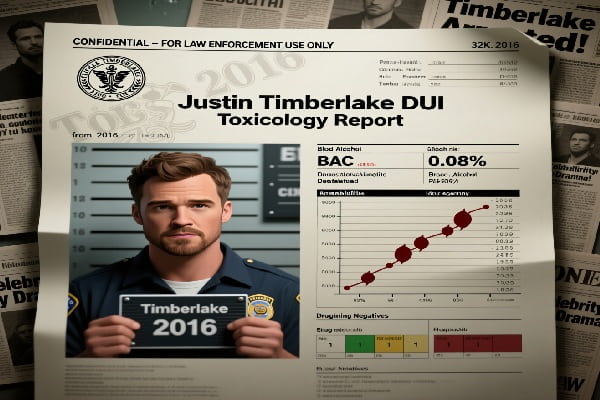On the night of June 18, 2024, news broke that pop icon and actor Justin Timberlake had been arrested for DWI (Driving While Intoxicated) in Sag Harbor, New York. As expected, the story went viral almost instantly, dominating social media and news outlets.
But amidst the frenzy, one detail caused massive confusion: the so-called Justin Timberlake DUI toxicology report. Rumors swirled that drugs, not just alcohol, were involved. Let’s set the record straight, dive into what actually happened, and examine how misinformation snowballed in the digital age.
What Happened: Justin Timberlake’s DWI Arrest
According to official police reports, Timberlake was pulled over just after midnight in Sag Harbor for failing to stop at a stop sign and maintain his lane. The arresting officer noted several signs of impairment:
-
Bloodshot, glassy eyes
-
The smell of alcohol on his breath
-
Slurred speech
-
Unsteady balance
-
Failure to pass a field sobriety test
Timberlake reportedly told the officer he had only consumed “one martini” earlier in the evening. He refused the breathalyzer, which is legally allowed in New York but carries automatic administrative consequences, like a license suspension.
From there, headlines exploded—not only about alcohol, but also about a rumored toxicology report suggesting drug use. That’s when confusion really started.
Debunking the Justin Timberlake DUI Toxicology Rumors
Shortly after the arrest, a parody account on X (formerly Twitter) posted a sensational claim: Justin Timberlake’s toxicology report allegedly showed MDMA (molly), poppers, cocaine, and Truvada (an HIV-prevention medication) in his system.
Naturally, the internet went wild. The hashtag #JustinTimberlakeDUIToxicology began trending, and memes, comments, and speculation flooded social platforms. But here’s the truth: it was completely false.
Where the Misinformation Came From
-
The original claim came from a satirical account known for parody content.
-
It was intended as a joke, not a news report.
-
Many users, however, mistook it for real news and reshared it widely.
Verification by Fact-Checkers
-
Reuters Fact Check investigated and confirmed that no credible news outlet reported these drug claims.
-
No official toxicology report indicating drug use has been made public.
The episode highlights how fast misinformation can spread online, especially when it involves a celebrity.
What the Official Records Say About Justin Timberlake’s DWI
Here’s what we know from official sources:
-
Alcohol was the only confirmed intoxicating factor, based on the arresting officer’s observations.
-
Timberlake refused the breathalyzer, so no blood alcohol concentration (BAC) was recorded.
-
Police reports and court filings make no mention of drugs.
-
Toxicology testing, if conducted, has not been publicly released.
So, the claims circulating about drugs in Timberlake’s system are entirely unsubstantiated.
How the Media and Public Reacted
Social Media Amplification
The rumor about drugs spread like wildfire, largely due to social media’s echo-chamber effect:
-
A single satirical post was reshared thousands of times without verification.
-
Platforms like X, Facebook, and Reddit helped the false narrative gain traction.
-
Even fans were unsure what to believe for a while.
Celebrity Misinformation Fatigue
This isn’t unique to Timberlake. Celebrities often face exaggerated or false accusations. But the speed at which this toxicology rumor went viral underscores the dangers of unchecked information online.
Legal Outcome: Justin Timberlake’s DWAI Plea
On September 13, 2024, Timberlake entered a guilty plea to a reduced charge of Driving While Ability Impaired (DWAI) under New York law, which carries lighter penalties than DWI.
Terms of the Plea Deal
-
$500 fine and $260 surcharge
-
25 hours of community service
-
90-day suspension of his driver’s license
-
Participation in public education on impaired driving
Timberlake later made a statement:
“I regret getting behind the wheel and not using better judgment. Please don’t drink and drive.”
His legal team clarified that Timberlake was not legally intoxicated, but the plea helped avoid a prolonged court battle.
Public Image and Career Impact
Despite the initial scandal, Timberlake’s career remained largely unaffected.
-
He continued his “Forget Tomorrow” world tour and high-profile performances.
-
Fans largely sympathized, appreciating how he let the legal process speak rather than feeding media speculation.
-
When the toxicology rumors were proven false, public support shifted in his favor.
This incident demonstrates how careful handling and transparency can mitigate potential damage to a celebrity’s reputation.
Why the Toxicology Misinformation Matters
This case is a textbook example of digital misinformation at work:
-
A fake toxicology report gained more attention than official court records.
-
The public’s appetite for scandal fueled the spread.
-
Even after fact-checking by outlets like Reuters, the rumor persisted online.
In today’s age of AI-generated content, deepfakes, and clickbait headlines, this incident shows just how quickly a false narrative can take root — especially when tied to a well-known figure.
Lessons from the Justin Timberlake DWI Case
-
Verify Before Sharing – Not every sensational social media post is true.
-
Celebrities Are Vulnerable – Public figures often face exaggerated claims that can spread uncontrollably.
-
Transparency Matters – Letting facts emerge from official sources helps control misinformation.
-
Misinformation Has Real Consequences – Even false claims can harm reputations temporarily.
-
Social Media Amplifies Everything – A joke or parody can go viral within hours.
Conclusion: Setting the Record Straight
To summarize:
-
Justin Timberlake’s DWI arrest was real.
-
Alcohol was the only confirmed factor; he refused a breathalyzer.
-
The so-called toxicology report listing drugs was entirely false, originating from a satirical social media post.
-
Timberlake pled guilty to DWAI, completed community service, and issued a public message about responsible driving.
-
His career and public image remained largely intact, and the rumors serve as a cautionary tale about the dangers of misinformation.
In the end, this episode reminds us that not everything we see online is true. Critical thinking, fact-checking, and patience are more important than ever—especially when it comes to viral celebrity news.

